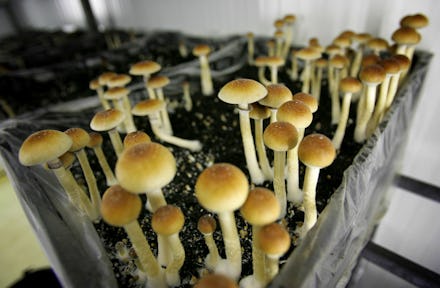Magic Mushrooms May Be the Key to Quitting Smoking

Magic mushrooms might save lives. A new study in the Journal of Psychopharmacology has found that just two or three physician-assisted experiences with psilocybin mushrooms were able to coax a dozen long-term smokers to permanently kick the habit, triumphing in a controlled study where other approaches failed.
The study: Fifteen pack-a-day, long-term cigarette smokers were treated to cognitive therapy for 15 weeks and given a single, pill-based 20mg dose of the active ingredient in magic mushrooms (psilocybin) over two-three sessions starting at the five-week mark, when the volunteers agreed to quit smoking. The researchers controlled the trip to prevent anxiety, playing music in a laboratory set up like a living room. A second, stronger dose was administered two weeks later, and an optional third trip was offered near the conclusion of the experiment.
Six months later, 12 of the 15 participants in the study were no longer smoking cigarettes. Lead researcher Matthew W. Johnson of John Hopkins told the Washington Post that he credited psilocybin for triggering a psychological change in the subjects. The psilocybin "trips," he said, left participants feeling "profoundly changed" and, according to the Post, feeling "more capable of accomplishing things, more open to different viewpoints than the ones they previously held, and some even reported fewer feelings of nicotine withdrawal (though most reported cravings of some kind)."
"That kind of personality openness is consistent with addiction recovery," Johnson told the Post. "They have these 'aha' moments where they believe 'wow, I can do this.'
"This is really targeting, I believe, addiction," Johnson added. "It's exciting that this seems to be a novel model of effecting and understanding human behavioral change, beyond the particular behavior in question."
According to the Post, Chantix, the leading anti-smoking product, has a 35% success rate after six months. When compared to this study and psilocybin's success rate of 80%, the results are astounding. And because giving up cigarettes lowers a smoker's risk or lung cancer by 70% and increases their life expectancy, it's not that big of an "exaggeration to say this experiment alone might have saved a few peoples' lives," notes the Post.
Backed-up science. The results dovetail nicely with a 2011 John Hopkins study that examined the long-lasting spiritual and medical benefits of controlled exposure to psilocybin and found that tripping can spur long-lasting psychological growth. Eighteen months later, all but one of the 18 test subjects administered the drug in a relaxed setting reported that the trip was among the five most important experiences of their lives. Other research has found that magic mushrooms can help patients with terminal diseases come to terms with their mortality and ease the transition to the end of their lives.
Why you should care: Scientists don't yet fully understand what psilocybin does to the brain, but initial research into the effects of tripping on magic mushrooms has shown that they could potentially help many patients break with long-term habits and embark on new, healthier chapters in their lives. As attitudes towards drugs across America rapidly change, more robust, evidence-based science may emerge that will challenge longstanding perceptions about various illicit substances.
Call me crazy, but there might yet be a day when you'll be able to go out to a nice, calm psychedelic spa in the country where soft-spoken and gentle staff walk you through a trip in a controlled setting. And when you leave, the cigarettes stay in the trash.